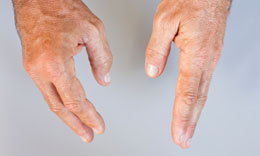Swollen finger joints are generally caused due to an injury and with standard treatment, normal functioning of the joints is restored.

A joint is defined as an area where 2 bones connect. Each finger excluding the thumb has 3 joints. Swollen finger joints are painful and can disrupt hand function considerably. In other words, this condition can interfere with daily routine tasks. Even day-to-day activities like holding a brush or a handshake may cause immense pain.
Causes
Injury
An injury to the hand that significantly affects the finger joints, can also result in their swelling. Joint injuries involving the hand are common among athletes. If the injury is severe, a hand surgeon is required to fix the joint pain.
Overuse
Excessive use of the hand, throughout the day, can be detrimental to the joints. Finger joint pain is the most common complaint among manual laborers. Too much work puts undue strain on the fingers, which often leads to swollen finger joints.
Rheumatoid Arthritis
This form of arthritis that commonly affects the fingers, is one of the leading causes of swelling in finger joints. As we all know, arthritis is a condition that triggers painful inflammation of the joints. However, in case of rheumatoid arthritis, the swelling is not limited to the joints and can spread to the surrounding tissues as well. The ligaments, tendons, and muscles that hold the joint in its proper position may also be damaged. As a result, the joints become stiff and in such cases moving the fingers is quite difficult. If no treatment is taken, joint deformity patterns are observed that eventually damage the bone structure. This is an autoimmune disorder in which the 'soldiers of the body' (white blood cells) invade the healthy cells of the body, which may also cause fatigue and fever. Episodes of rheumatoid arthritis may come and go or last permanently.
Joint Infection
In an infected joint, that is caused by a virus, bacteria, or fungus, there is surplus build up of fluids, thus making them appear red and swollen. Many times, an infection occurring in some other part of the body move to any joint causing inflammation. Immediate treatment is essential to bring normalcy within the joints.
Bone Fracture
A broken bone due to a trauma, such as a heavy object falling on fingers, can lead to joint swelling. The affected joint can be a source of great discomfort and treating the bone may help to relieve the pain. Swollen fingers joint is often an indication that something wrong has happened with the bone.
Osteoarthritis
Osteoarthritis, the most prevalent form of arthritis, is a condition in which the cartilages covering the end of the bones get eroded. As a result, the bones surfaces directly come in contact and rub against each other during movement. This destruction of cartilage not only makes the joints swollen but can cause excruciating pain while moving the affected joint. The joints of the fingers, hips and the knees are the most common sites of osteoarthritis. The cartilage deteriorate slowly and that is why by the time osteoarthritis is diagnosed, the patient is already in his late 50s.
Edema
Edema, which means excess accumulation of fluids can also make the fingers and the ankles swollen. Although fluid build up causes swelling in the body tissues, the inflammation may well spread to the nearby joints. Thus, swelling of fingers may also indicate that the fluid is trapped somewhere near the joint.
Treatment will totally depend upon the factors that are responsible for causing painful joint swelling. However, giving rest and application of ice to the sore finger joints, is the mainstay of the treatment. In case of a joint infection, doctors often recommend the use of antibiotics or anti-fugal medications. A joint injury that causes complete rupture of the muscles surrounding it, will require a surgery as well as exercise for repairing the muscles and to stabilize the joints. Non steroidal anti-inflammatory medications may be prescribed for the treatment of rheumatoid arthritis. Although, they help to reduce the pain and inflammation, they need to be taken as instructed by the doctor, to avoid side effects. Use of heating pads for 10-15 minutes may also help to relieve the pain.


 A joint is defined as an area where 2 bones connect. Each finger excluding the thumb has 3 joints. Swollen finger joints are painful and can disrupt hand function considerably. In other words, this condition can interfere with daily routine tasks. Even day-to-day activities like holding a brush or a handshake may cause immense pain.
A joint is defined as an area where 2 bones connect. Each finger excluding the thumb has 3 joints. Swollen finger joints are painful and can disrupt hand function considerably. In other words, this condition can interfere with daily routine tasks. Even day-to-day activities like holding a brush or a handshake may cause immense pain.